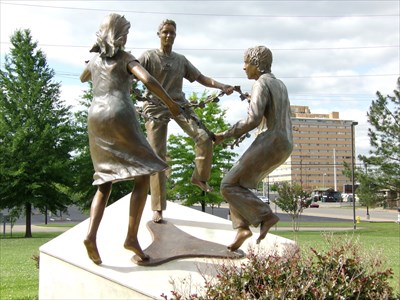Change Is Possible
The 4th of July fell on a Sunday this year. The congregation I attend, the Boston Avenue United Methodist Church in Tulsa, has a tradition of making July a “revival” month. Most years, that means more singing and less liturgy. But for the 4th, the normal three-service schedule was replaced by a “unity” service. The church set up an open-sided tent, large enough to cover several hundred people. I could not smell sawdust but the gentle breeze did bring a bit of musty something from the tent, and one could see bits of daylight through wear-holes on that, thankfully, not rainy Sunday in the church park. So, we had some elements of a tent revival.
The playing and singing of “The Battle Hymn of the Republic” captured my attention and imagination as I sat on the folding chair, genuine funeral home fan in hand. The congregation sang more lustily than many hymns they sing (these are gentrified Methodists rather than the brush-arbor sort once known as “shouting Methodists”). Being accompanied by a small, fine orchestra added energy and volume to the singing. Despite my seminary-learned hesitancy to embrace war images, I couldn’t help it. My emotions swelled.
And here is where my imagination went.
Here at 13th St. and Boston Ave. in Tulsa, on July 4, 2021, is a congregation founded by the slavery-defending, Jim Crow upholding Methodist Episcopal Church, South, singing the song that rallied Union troops to fight a righteous war against the congregation’s ancestors. I doubt the founders would have smiled at the irony.
On the Sunday after the 1921 Tulsa Race Massacre, the congregation heard a sermon from the resident bishop. He castigated the Black community for causing their own destruction.
A century later, the congregation has formed a serious relationship with one of the churches whose building was destroyed but whose people re-built and continues to this day. In addition, the congregation made a definitive, substantive commitment to work over the next several years to becoming a more anti-racist, pro-reconciling congregation. The annual Martin Luther King, Jr. commemoration service is hosted by Boston Avenue.
A senior pastor from a few generations ago who went from the congregation to the episcopacy (an erstwhile common circumstance for the congregation’s senior pastors) railed against homosexuality. As a bishop, he damaged the cause of full inclusion in the church. He died of AIDS contracted from his own extramarital, unsafe sexual relationships.
Today, the Boston Avenue congregation–including both its pastoral and lay leaders– is known as one of the best religious friends of LGBTQ persons in Tulsa and is committed to a future in which sexual orientation and gender identity are irrelevant to membership and ministry. The entire church complex is the staging ground for Tulsa’s large, boisterous Pride Parade.
 The immediate past senior pastor, who served for over three decades, was named for the bishop who preached the “you-brought-it-on-yourselves” 1921 sermon. But he ministered differently from his namesake. He is highly respected and admired in the Tulsa community for his interfaith outreach, especially for his contribution to Jewish-Christian relations. The sculpture in the church park of three children—Jewish, Christian, and Muslim—dancing in a circle is one testament to his work and his legacy. Tulsa would be much-the-poorer if one withdrew all the members who are interfaith and social justice leaders, influencers, and line-workers in the holy task of moving Tulsa toward a more just and compassionate future.
The immediate past senior pastor, who served for over three decades, was named for the bishop who preached the “you-brought-it-on-yourselves” 1921 sermon. But he ministered differently from his namesake. He is highly respected and admired in the Tulsa community for his interfaith outreach, especially for his contribution to Jewish-Christian relations. The sculpture in the church park of three children—Jewish, Christian, and Muslim—dancing in a circle is one testament to his work and his legacy. Tulsa would be much-the-poorer if one withdrew all the members who are interfaith and social justice leaders, influencers, and line-workers in the holy task of moving Tulsa toward a more just and compassionate future.
I see the current lay and pastoral leaders calling the congregation to even more change, and I see many congregants responding with their voices and their feet.
Yes, Julia Ward Howe, God’s truth is marching on. It may take a lot longer than we’d like, for we prefer to run a sprint rather than a marathon. And the marathon we’re running is multigenerational. We hand off the baton to each new generation to further the work.
The course for truth, compassion, and justice is zig-zag, with switchbacks, sometimes random. Truth and true living do not emerge all at once. Not everyone is or will be a convert. Some hearts will remain stony, unmoved, caged by fear. Some still prefer white, cis-gendered, male cultural dominance.
But change is possible, I reflected from my chair as I joined the applause at the end of the Union’s anthem. Change is possible because I know this congregation has changed from the congregation that was here in 1921.
As have so many others. Changed for the better.
Not changed enough, for sure. But, because we know we have changed, we know we can change.
God’s truth is marching on. We are invited to join the parade.
It is our turn—to turn.
Dr. Gary Peluso-Verdend is president emeritus at Phillips Theological Seminary and is the executive director of the seminary’s Center for Religion in Public Life. The opinions expressed in this blog are those of the author. Learn more about the Center’s work here and about Gary here.


Comments are closed.